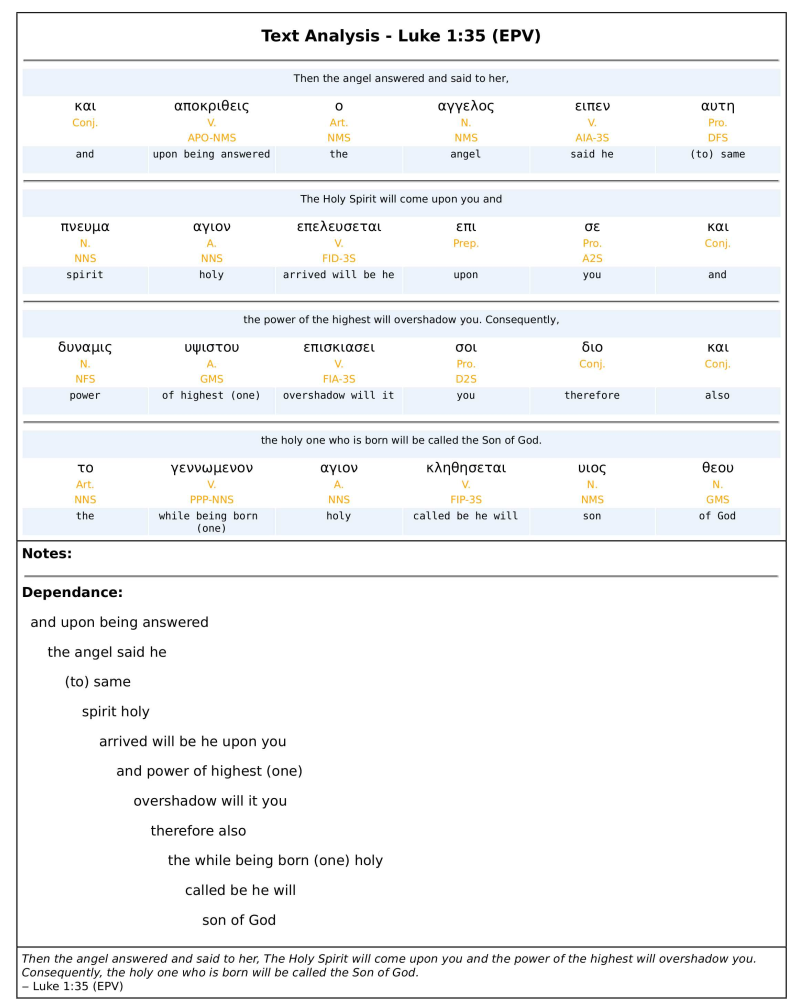Luke states the following in 1:35 :
και το γεννωμενον αγιον κληθησεται υιος θεου
also that holy thing which shall be born of thee shall be called the Son of God [KJV]
Note : My question relates to the TR text (I am quoting Stephens 1550) and I am aware that there is a variant (Scrivener 1881 notes it in italic) which includes εκ σου and which further complicates the issue. I wish to remain with the TR and to examine the translations from that text only.
My question is - where does 'thing' come from ?
'Born' is not a good translation of the verb γενναο, since 'born' in English may refer to the whole conception to delivery process or it may refer to delivery only. And in any case γεννωμενον is a present participle and there is nothing future about it.
Young's literal gives 'holy-begotten thing' for το γεννωμενον αγιον and the EGNT (Englishman's Greek New Testament) has 'the born holy thing'.
Mounce's Grammar tells me that γεννωμενον is the present participle in the middle/passive voice. And tells me that it is either the neuter singular nominative or the masculine singular accusative.
I suspect that translators are getting 'thing' from assuming that γεννωμενον is neuter singular nominative.
In 1:32, Luke reports :
και υοος υφιστου κληθησεται
and shall be called Son of the Highest [KJV]
This passive statement can be rearranged :
and Son of the Highest shall be called (he)
where Son is nominative and the invisible (he) would be an accusative.
Thus 1:35 could also be rearranged :
and 'Son of God' shall the being-begotten holy be called
Here, I have rendered 'being-begotten' as present tense since it translates a present participle and I have rendered it as 'begotten' to more accurately express γενναο.
(My rendering here agrees more with Young's Literal than with either KJV or EGNT.)
This shows that the nominative subject of the sentence is 'Son of God' and the predicate is 'the being-begotten holy be called' wherefore it is an accusative expression.
Therefore there is no 'thing'.
Γεννωμενον is masculine singular accusative (not neuter singular nominative) and αγιον is an adjective. There is no 'thing'.
The implications of the translation are considerable. If 'the being-begotten' refers to Deity and if it refers to a Divine begetting (the Father and the Son) then the meaning is not as traditionally has been accepted.
And if 'the holy' refers only to that which came from Mary - something separated in holiness from her - then 'thou shalt conceive', Luke 1:31 (συλληφη, from sullambano 'bring together') refers to a bringing together of that which is Divinely begotten (a present matter indicating an eternal begetting) and that which is separated, in holiness, from the virgin.
Am I correct in my assumption that 'thing' comes from a mistaken translation of a supposed nominative neuter (when it should be a masculine accusative) or is there somewhere else that translators are finding 'thing' ?
